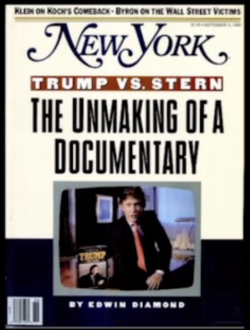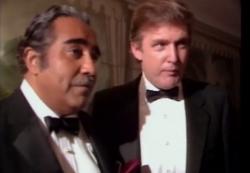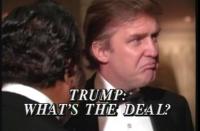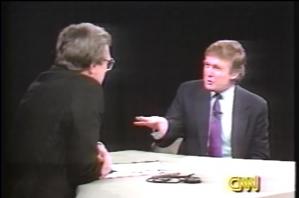Trump: The Documentary
A New York street fight finally unearthed, 25 years later
by Jim Swift
A September 1989, feature in New York magazine by Edwin Diamond, titled “Trump vs. Stern: The Unmaking of a Documentary” closed with this line:
"A close associate of Stern's says, 'Trump may be tough, but so is Leonard. He's living a good life now, and he doesn't need this. But somewhere down the road, he'll be heard from."
Two and a half decades later, Leonard Stern, a real estate competitor of Trump's, has a late-blooming investment that is finally airing, even though he hasn't had anything to do with the project since the Reagan administration. This, thanks to a producer he once employed named Libby Handros.
Just yesterday, Trumpthemovie.com went online with a hilarious teaser trailer that shot around the web. (You can watch the full movie here.) The documentary film,Trump: What's the Deal? was the subject of Diamond's 1989 feature story. Funded by Stern, the documentary was never broadcast over the airwaves.
Handros tells THE WEEKLY STANDARD, "We did two back-to-back screenings at the Bridgehampton Community House, July 3, 1991, which was ironic because it was the day that Donald announced his engagement to Marla Maples." According to the New York Times, Stern asked the producers not to screen it, but they did it anyway.
Recounted to Diamond, the documentary was intended to be the first of a few Stern-funded documentaries on “men whose persona took on a life of its own,” according to Stern's wife Allison, a former television producer. People like George Steinbrenner, Donald Trump, Ross Perot, and Lee Iococca, the article suggests.
Narrated by a Robin Leach-sounding British man, allegedly Peter Foges, the trailer teases the documentary by comparing The Donald of the late 1980's to The Donald of today.
The trailer claims, “the new Trump and the old Trump, are thesame Trump.”
Back when the documentary was made in the 1980's, it was a critical, but seriously reported work produced by Ned Schnurman, a long-time PBS man and creator of Inside Story. Joining him were Al Levin, also of PBS, and Libby Handros, who joined Schnurman right out of college.
The production, created by Schnurman's independent firm “The Deadline Company,” was hired by Leonard Stern, a billionaire, who also owned the Village Voice, a weekly called 7 Days, and “several publishing interests.” Stern claimed, "I have nothing to do with the editorial side at the Voice or 7 Days, and I have the same rule for television."
But, before the film could make it to the screen, producer Ned Schnurman claims that Trump was "threatening litigation before, during, and after the airing of the program."
Per Diamond's long-read feature, there is more to the story.
[7 Days] reported (in 1988) that some resales of the condominiums on Trump Tower were not going well. The article also questioned the quality, design, and the construction of the Tower and two other Trump buildings. The resale losses were not Trump's -- as condominium developer, he'd already had his payday -- but his pride was involved. As a Trump friend explains, 'You can call Donald mean, arrogant, egotistical, vain, tough, and it doesn't bother him deep down. He takes those as synonyms for “powerful.” But suggest that his product is second-rate and that sets him off. To him it says, “You're less than the best."
As Trump discovered the existence of the forthcoming documentary, Diamond wrote:
"In the Trump view, a business rival has loosed two sets of news hounds on him, one print and one electronic."
This, perhaps, is where the feud started.
An "unattributed report" in the Daily News suggested Leonard Stern's wife Allison "continually phoned Trump's office asking for a date” and, as Diamond writes, Stern debated suing Trump after reading the report, but did not.
“There was no vendetta, despite what Trump claims... He made up a story about my wife and then had a representative call and say 'We'll retract if you drop the program.' They tried to initiate meetings to 'bury our hatchets.' I told them, 'Drop dead.'”
Vendetta or not, Stern did pour more money into the project after the documentary staff ran out of money, but only up to the point where he worried he'd lose money.
“If Trump were writing a headline for this documentary … it would no doubt be TRUMP WINS. His first amendment specialist, Martin Garbus, also believes the story is over. 'They're saying 'furlough' because they don't want to say 'defeat,'" Garbus says. Moreover, according to Garbus, the whole episode represents a resounding defeat 'for checkbook journalism -- for rich people who are trying to take over the media.'
Civil libertarians, however, would have a question for Garbus: Which rich people? Trump spent a lot of time and money to 'take over' a documentary he didn't like. He remains in control of his media image, if not the media.”
In the New York market, not only did Trump's concerns about its airing play a role, but his and Stern's investments and influence in the region canceled each other out – leaving no media players interested in, effectively, peeing on the transformer that was a regional mogul fight. Take a side, and you lose ad money. Air it, and open yourself up to a potential legal liability.
Also, Trump: What's the Deal? was produced at a time when the so-called “Fairness Doctrine” was on its way out, and, as one local television station manager told Diamond, commercial stations had to “guard their licenses against charges of 'bias, poor news judgment, and questionable taste.'"
The teaser trailer, tied into the current events surrounding The Donald, make it seem more like a modern-day Hillary: The Movie as produced by the now-eponymous Citizens United but resurrected for the present. Except that it's not.
The film, clocking in at a little over an hour and half is hard hitting, sure. Critical? Yes. Fairly reported? Appears so, but, as the rules of Trump: The Game clearly state: “You cannot lie to another player or intentionally break a promise. Of course, some situations may be open to interpretation.”
If Trump ever responds to the film, and he hasn't yet, look for him to abide by this rule. Trump hasn't contacted Handros yet, nor have his lawyers, but seven years after the film was finished, he reportedly ran into co-producer Al Levin and said "Oh, you're the guy who is doing that hatchet job on me."
With the advent of the Internet and today's campaign culture, and the ability to dance under the protections of Citizens United, the release of the the film isn't as much of a legal hassle as it would have been back when the late Edwin Diamond did his New York feature story on it in 1989.
Handros tells THE WEEKLY STANDARD she inherited the film after Schnurman died, and “had it sitting there waiting for the right time to bring the film out. And I knew that time would come." Handros hasn't heard from Stern since he cut off funding, and chose to release it on her own.
"There is a lot to be said for being able to release it now with the Internet, and not having to deal with gate keepers. I think it's ironic that Donald is running for President, were he to win, he's gonna swear to protect and defend the Constitution of the United States, and you have to wonder whether he ever read the first amendment."
As Diamond quoted in his feature, Chris Wallace, Sr., asked: "Can a rich man fund any documentary he wants in America? The answer is yes. Can a rich man try to stop any documentary? Yes. It's a free country."
"The two sorts of freedom are in collision." said Diamond.
Until now.
"It's great that people like us can get access to the public these days without having to appeal to three broadcast networks and some syndicators...” Handros says. “So yeah, it's a lot of fun to be able to get out there and make a point and know that you can make a point these days if it's important.... You can go out there and let the people make their own judgments."
As The Donald is surging in the polls before the first Republican debate in Cleveland next week, was there really a better time to release a 25-year-old critical documentary?
Might the press have some questions about it and Trump's past? Absolutely.
The film makes many bold claims and observations, too many to fully recount here, but they seem well sourced, with views of articles and headlines that in today's Internet age are easy to research.
One such claim is that today's Trump, just like the Trump of yesteryear, likes to insult people just to get an edge over them. Here's an exchange he had with Larry King on CNN:
Trump: Do you mind if I sit back a little bit, because your breath is very bad. It really is. Has this ever been told to you before?
King: No.
Trump: No? Okay, then I won’t bother.
King: [Laughter] That’s how you get the edge.
Another, was his ability to subsist on what he called “truthful hyperbole,” which is defined by Trump as “an innocent form of exaggeration.” Like, say, the construction of his famous Trump Tower – a 58 story building – which, by some strange magic, becomes a 68 story building. The building's architect, Der Scutt, tells the documentary makers, “This is salesmanship. Trump knows how to do it better than anybody.” Later in the film, the narrator says of Trump “If the Hyatt [hotel deal] had been a term paper on doing business in New York, the [Trump] Tower was a doctoral thesis.”
But, according to the documentary, Trump's successes in real estate weren't without controversy:
“Workmen pounded away on Trump’s apartment for three years. His downstairs neighbor stopped making her monthly payments. Lawsuits flew in both directions.”
Verina Hixon, Trump's neighbor in the Trump Tower, told the documentary team:
“I wanted to move in here because I saw it was going to be a great building with fantastic views. And also a bigger apartment than what I used to have. However, I never expected to have all these run-ins with my neighbor, who is Donald Trump, who lives above me, and… Since I moved in, he has done nothing else but construction.”
At another property, 100 Central Park South, rent-controlled tenants accuse Trump of using unusual methods to try and evict them, keeping the building in disrepair, and even offering to house the city's homeless in vacant units.
The film cuts to this terse 1983 exchange with Connie Collins from WNBC:
Connie Collins: “The tenants here [at 100 Central Park South] say that Trump's harassment has taken on many forms. For example, they say, a couple of years ago Trump offered the vacant apartments in this building to the city's homeless."
Trump: “I’m willing to give them heated, beautiful apartments with services and medical services if necessary."
Connie Collins: “Well, why not set up cots in this conference room?”
Trump: “Well, I'll tell you. Because here I don't have the room. Over there, I do.”
Another problem for Mr. Trump is the accusation that his projects once employed illegal immigrants from Poland. For a candidate strongly against illegal immigration on the stump, but peddling a different message to the press, the long-time legal challenge is a bit of a black eye for Trump on one of his most popular issues.
The documentary quotes John Szabo, an attorney for the illegal immigrant workers from Poland. He claims to have received a call from a “John Baron” who claims that Trump, posing as Baron, told him, “Donald Trump was upset that I was ruining his credit reputation by filing the mechanics liens, and that Mr. Trump was thinking of filing a personal lawsuit against me for $100 million dollars for defaming his, uh, reputation.”
According to The Daily Beast:
“Trump now acknowledged on the stand that he had used the pseudonym 'John Baron,' as had one of his assistants. But Trump insisted that his use of it was only long after the completion of the Fifth Avenue tower, which became the first of many properties on which he so rapturously bestowed his real surname. 'Lots of people use pen names,' he told a reporter after he stepped down from the witness stand. 'Ernest Hemingway used one.'”
Incidentally, Trump eventually named his future son "Barron."
Trump was no stranger to controversy on the way up, but as the documentary tells it, the way to ruffle Trump's feathers, or even render him speechless, is to ridicule him or make him the butt of a joke. (Though it's uncertain whether on the Fox News debate stage in Cleveland any candidates will take the risk of starting a street fight with Trump, stooping to his low level of hurling cartoonish New York-style insults.)
Rep. Charlie Rangel and TrumpDespite Trump's boyish charm, the documentary shows that his self-defense mechanism, an invective body armor of sorts, is indeed penetrable.
There's a scene in the film during Trump's very public first divorce from Ivana, where the narrator observes: “overnight, it seems, America turned from a fascination for what Trump has to what he could lose.” A reporter from CBS shoves a microphone in front of Trump as he walks out of a building and into a limo and asks: “Do you wish we'd all go away?” Trump sits down in the limo, looks at the camera, feigns a laugh, and says: “Absolutely.”
That same year, The Donald was having financial trouble in Atlantic City. A 1990 AP item titled “Commission approves Trump Bailout” recounts Trump saying to reporters, "This is a big hurdle and I'm happy. Maybe you can focus on someone else now." Alas, the AP cleaned up the quote, the documentary reveals.
Here's what Trump really said, captured on video:
“This is a big hurdle, and it's great, and I'm happy, and maybe you people can cover one of the millions of other people now. And sort of leave Trump alone.”
Leave Donald Trump alone? Who would have thought? Very un-Donald not to be seeking the spotlight.
As the press was obsessing over Trump's divorce and his dealings with Marla Maples, later his second wife, John Leo, a senior editor at U.S. News and World Report describes The Donald's deflation:
"the devastating thing about the Marla fad is that it opened Trump to ridicule for the first time. And that is very deflating, and its not only deflating it turns to publicity machine around. All the lovable quirks on the way up, look very foolish and stupid on the way down. And it's going to be very hard for him to come back from this kind of ridicule.”
Trump, of course, rose and fell again. Just as he would a few more times -- a modern-day Sisyphus.
Nobody likes losing, as Trump has many times over the years, and this film recounts. Perhaps it's all part of his grand strategy. “I learned at the Wharton School of Finance that the economy runs in cycles” he wrote in Trump: The Art of the Comeback, but the same could be said of Donald Trump. The Donald has cycles.
The question lots are asking now is, when will this one end?




